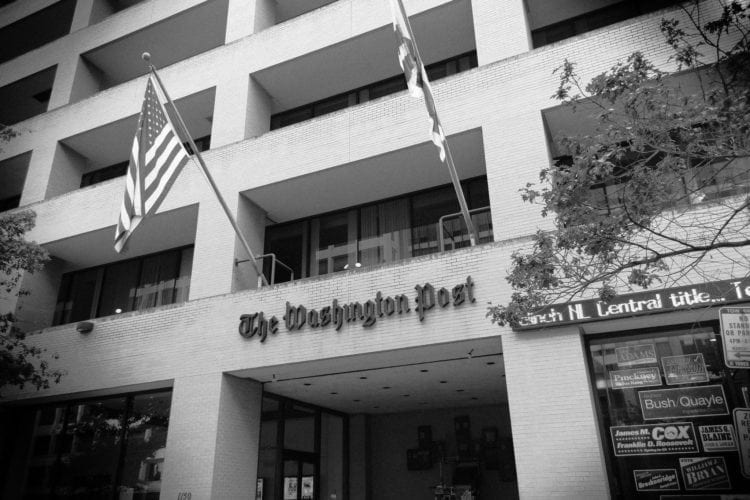“Can you think of an objective news source?” Shockingly, despite erosion in media trust, most Americans still believe print media much more than online independent websites, and Fox News leads the way in overall reliability, which says something about the respondents' ability to sort out disinformation from reliable fact. A January 16th Gallup Poll report, “American Views: Trust, Media and Democracy” (it’s issued in conjunction with the Knight Foundation), finds that a majority (by 51% to 44%) of Americans answer “No” to this question. Americans who characterize themselves as “Very liberal” answer “Yes” to it, at the exceptionally high rate of 67%, while respondents who claim to be “Moderate” have the lowest “Yes” rate, at 38%; so, conservatives are in between. By 66% to 32%, Americans say that news media “do not do a good job” of “separating fact from opinion”; and, while Democrats are only 44% holding that opinion, Republicans are 86% holding that opinion; so, there’s a very clear partisan difference on that question. Distrust of the news media has soared in recent decades; so that, whereas “In 1989, 25% of U.S. adults said there was a great deal of political bias in news coverage; now, 45% do.” Here are America’s 10 major news-media listed according to the percentages of the U.S. public who consider them to be “Objective”: Fox News: 24% CNN: 13% NPR: 10% Local news: 5% BBC: 5% MSNBC: 4% PBS: 3% NBC: 3% New York Times: 3% ABC: 3% Fox News is considered “Objective” by 60% of Republicans, and by 3% of Democrats. CNN is considered “Objective” by 21% of Democrats, and by 4% of Republicans. The average “Media trust” score is 54% from Democrats, 33% from Independents, and 21% from Republicans. The highest score for feeling “Very confident” “in [one’s] own ability to sort out facts” from news-reports, is 45% among “Very liberal” respondents, and the lowest score is 23% for respondents who are “Moderate” and also for ones who are “Conservative. However, 41% who are “Very conservative” — almost as high as the 45% among the “Very liberal” group — feel “Very confident” that they possess this ability; so, the two ideological extremes have the people who are the most confident about their abilities to understand reality correctly. Americans who aren’t so extreme are also not so confident about ‘the facts’. The extremists at both ideological ends tend to be the most confident about their views on public policies. One of the main reasons why news that’s received online is especially distrusted is shown by the answers to this remarkable question: “As you may know, it’s possible that the methods major websites use for selecting the news stories they show to individual users may exclude certain kinds of stories depending on what the user has read in the past. How much of a problem do you consider this for our democracy?” 57% said “Major problem,” 35% said “Minor problem,” and only 6% said “Not a problem.” Thus, apparently, the only way for online news-sites to become trusted by the public would be for them to state clearly, and adhere to the policy, that the selection and placement of news-stories on that given site aren’t affected by anything about the individual viewer, but are instead exactly the same for the entire audience of that site (just like is always the case for offline — the print and broadcast — newsmedia). Doing this, and constantly making clear that it is doing so (presenting the same home-page or “front page” to everybody), would greatly improve the market-shares of online news media, because of the following findings that also were reported in this study: 54% trusted “Your local newspaper.” 52% trusted “National network news.” 51% trusted “Major national newspapers.” 46% trusted “Cable news.” 38% trusted “News aggregators.” 36% trusted “Internet-only news websites.” Whereas all of the most-trusted media are offline, all of the least-trusted media are online. The American public, in this study by Gallup and the Knight Foundation, are thus making starkly clear that online news media will need to make this change, if these media want to be trusted as much as are the legacy — print and broadcast — news media (which aren’t even capable of selecting the ‘news’ so as to appeal to the viewer or listener). This would be a revolutionary change in the current practices of online news media, and it would considerably increase their audiences. However, advertisers would probably be opposed to its being done. Perhaps the current practice is simply one of a number of ways in which the ‘news’ media are more concerned to serve their advertisers than to serve their audiences. ‘News’ media sell their audiences to their advertisers, and sell the ‘news’ to their audiences; and, perhaps, one reason why the ‘news’ isn’t trusted by the audiences is that, to a significant extent, audiences are recognizing the tensionthat exists between these two business-objectives. Apparently, the public believe that this tension is even worse on online news sites than it is on print and broadcast newsmedia. 69% of Americans in this poll agreed with “Owners of news outlets attempting to infuence the ways stories are reported” constitutes “a major problem,” and most others thought it to be “a minor problem”; so, this “problem” might be the biggest single reason why Americans distrust the ‘news’: capitalism provides a press that reflects the interests of the owners and their advertisers — the interests of the rich — not the interests of the general public. Remarkably, the partisan breakdown of the 69% who thought this to be “a major problem” isn’t what one would expect if one equates “Republicans” with “conservatives,” and Democrats with non-“conservatives”: whereas 76% of Republicans said “major problem” here, only 61% of Democrats did. (72% of Independents did.) Republicans dissented from capitalism, on this question, even more than did Democrats. On this crucial issue, Republicans are more progressive than Democrats are; Democrats are the most conservative (and pro-capitalist) of the three groups. On 18 January 2016, Richard Edelman, owner of the global PR firm Edelman, headlined “Beyond the Grand Illusion” (of a world that’s increasingly coming together), and he summarized his firm’s polling the prior year in 28 countries, by observing: The average gap in trust in institutions between the elites and the mass population has grown to 12 points (across the developing and developed world). In the U.S., the difference is 19 points; in the U.K. it is 17 points; and in India, it is 16 points. The Edelman TRUST BAROMETER also reveals that trust inequality correlates with income inequality across the world. In 18 of 28 countries surveyed, we see a double-digit gap in trust between high-income and low-income respondents. In the U.S., the gap is 31 points, in France it is 29 points, in Brazil it is 26 points, and in India, 22 points. Then, a year later, on 15 January 2017, based on his firm’s study of their polls during 2016 in those countries, he headlined, about 2016 having shown “An Implosion of Trust” worldwide, and he wrote: The trust collapse has moved beyond a simple “class vs. mass” problem to a systemic threat. More than three-quarters of respondents among both informed and general populations agree that the system is biased against regular people and favors the rich and powerful. Although we have reached unprecedented trust gaps between the informed public and the mass population averaging nearly 20 points in the U.S., U.K. and France (and gaps of 10 or more points in strong economies such as India and China), the waves of anger are now lapping at even the top rungs. Close to half of the “informed public” — adults 25-64 with a college education, in the top 25 percent of income, and consume large amounts of media — have lost faith in the system. Gallup’s latest finding in America is thus showing the U.S. portion of what is, actually, a global problem, which extends beyond merely the media, and beyond merely the United States. The super-rich keep getting richer and richer, while the rest of the population either stays the same or else gets even poorer and angrier than they were before. Increasingly, around the world, publics are coming to see the ‘news’ as being shaped by the owners of, and advertisers in, the ‘news’media. ERIC ZUESSE, Senior Contributing Editor Investigative historian Eric Zuesse is the author, most recently, of They’re Not Even Close: The Democratic vs. Republican Economic Records, 1910-2010, and of CHRIST’S VENTRILOQUISTS: The Event that Created Christianity. Besides TGP, his reports and historical analyses are published on many leading current events and political sites, including The Saker, Huffpost, Oped News, and others. [premium_newsticker id=”154171″]


![]()
 What will it take to bring America to live according to its own self image?
What will it take to bring America to live according to its own self image?
Gallup: Americans Distrust News Media — Especially Online
850
ERIC ZUESSE, Senior Contributing Editor Investigative historian Eric Zuesse is the author, most recently, of They’re Not Even Close: The Democratic vs. Republican Economic Records, 1910-2010, and of CHRIST’S VENTRILOQUISTS: The Event that Created Christianity. Besides TGP, his reports and historical analyses are published on many leading current events and political sites, including The Saker, Huffpost, Oped News, and others. [premium_newsticker id=”154171″]
About the author

![]()
 What will it take to bring America to live according to its own self image?
What will it take to bring America to live according to its own self image?
previous post





In other words, “it’s complicated.” Other factors that influence opinion include class and race, and certainly the degree to which one turns to news media/types of media selected. Through it all, keep in mind that all media are designed to appeal to/influence a particular target audience.